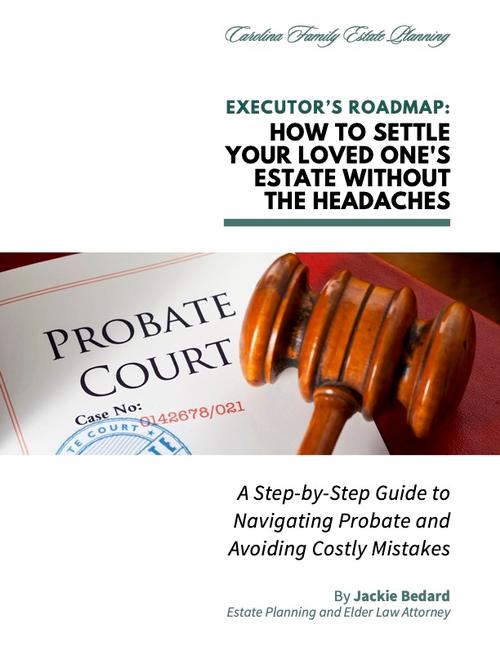
Are you handling probate and estate settlement for a family member or loved one? Probate is the process of settling a deceased (decedent) person’s estate and distributing their property to heirs. This process takes place under the supervision of the county probate court and involves the appointment of a personal representative to take care of the estate’s affairs.
As the representative, you would typically pay estate debts, fees, and taxes on behalf of the decedent before distributing the decedent’s property according to the will or the North Carolina Intestate Succession Act.
If your family member passed away without an extensive portfolio of assets, it might be possible for you to settle the estate without following the full probate process. North Carolina law provides small estate administration processes, allowing for a more streamlined resolution that saves valuable time and money for the administrator and the beneficiaries of an estate.
The Affidavit for Collection of Personal Property of Decedent (Collection by Affidavit) (Form AOC-E-203B) is one of these expedited processes. In this article, we discuss:
- The requirements of a small estate
- The Collection by Affidavit process
- The benefits of filing a Collection by Affidavit
Do you need a probate lawyer to help you file a Collection by Affidavit? At Carolina Family Estate Planning in Cary, North Carolina, we’re here to help. Contact us today to schedule a needs assessment call.
Does the Estate Qualify as Small?
A Collection by Affidavit is available for a small estate whether the decedent dies intestate (without a will) or testate (with a will). The affiant, or person who makes the affidavit, can be the public administrator or the decedent’s heir, creditor, executor, or devisee.
If The Decedent Is Not Married
If the decedent is not married, the estate qualifies for this proceeding if the value of the decedent’s personal property, minus liens and encumbrances, is no more than $20,000. This value includes all movable assets—for example, vehicles, jewelry, and livestock. Intangible assets, such as stocks, bonds, and bank accounts, also form part of the decedent’s personal property.
If The Decedent Is Married
Suppose the decedent is married, and someone other than the surviving spouse applies for the affidavit. In that case, the estate qualifies if the decedent’s personal property value—minus liens, encumbrances, and spousal allowance ($60,000)—is no more than $20,000.
The surviving spouse may apply for a Collection by Affidavit as the decedent’s sole heir. In this case, the value of the decedent’s personal property, minus liens, encumbrances, and a spousal allowance of $60,000, must not exceed $30,000.
Additional Notes on Calculating Estate Value
When determining if an estate legally qualifies as small, the following factors do not form part of the calculation:
- Life insurance policies and retirement accounts with beneficiary designations
- The value of the decedent’s real property
Real property includes immovable assets, such as land, buildings, and mineral interests. If real property is part of the estate and goes through liquidation to pay debts, the court will follow a formal proceeding involving notice to the creditors.
The encumbrances that don’t form part of the estate’s value include expenses payable from the estate—for example, attorney fees, administration costs, and funeral bills. Contact one of our probate attorneys at Carolina Family Estate Planning today to schedule a discovery meeting to determine if an estate qualifies for this expedited process.
Collection by Affidavit: The Process
At least 30 days must pass from the date of the decedent’s death before the Collection by Affidavit process can start.
If there is no application for a personal representative during these 30 days, the affiant (an heir or other involved person) can file an Affidavit for Collection of Personal Property of Decedent (Form AOC-E-203). The affiant must file this affidavit with the Clerk of Superior Court, and the filing must take place in the county where the decedent lived.
Once the court has approved the application, it will authorize the affiant to collect and administer the estate. The affiant must pay debts, and distributions must occur according to the will (or the intestate succession law if the decedent dies without a will).
After paying the estate debts and distributing the estate property, the affiant must file a closing affidavit with the Clerk of Superior Court using the Affidavit of Collection, Disbursement, and Distribution (Form AOC-E-204). This closing affidavit shows all estate income, debt payments, and distributions.
Carolina Family Estate Planning: Your Probate Attorneys in Cary, North Carolina
The Collection by Affidavit process is significantly quicker and more affordable than a formal probate proceeding. This small estate administration process doesn’t have the same waiting period and creditor notice requirements as the probate process.
Do you want to file a Collection by Affidavit? At Carolina Family Estate Planning, our probate attorneys can help you determine if such a small estate administration is possible. We will also help you navigate the application process, ensuring that you avoid potential pitfalls. Call us in Cary, North Carolina, at 919-443-3035 today or schedule a needs assessment call with a member of our friendly, professional legal team.
Copyright © 2022. Carolina Family Estate Planning. All rights reserved.
The information in this blog post (post) is provided for general informational purposes only and may not reflect the current law in your jurisdiction. No information in this post should be construed as legal advice from the individual author or the law firm, nor is it intended to be a substitute for legal counsel on any subject matter. No reader of this post should act or refrain from acting based on any information included in or accessible through this post without seeking the appropriate legal or other professional advice on the particular facts and circumstances at issue from a lawyer licensed in the recipient’s state, country or other appropriate licensing jurisdiction.




